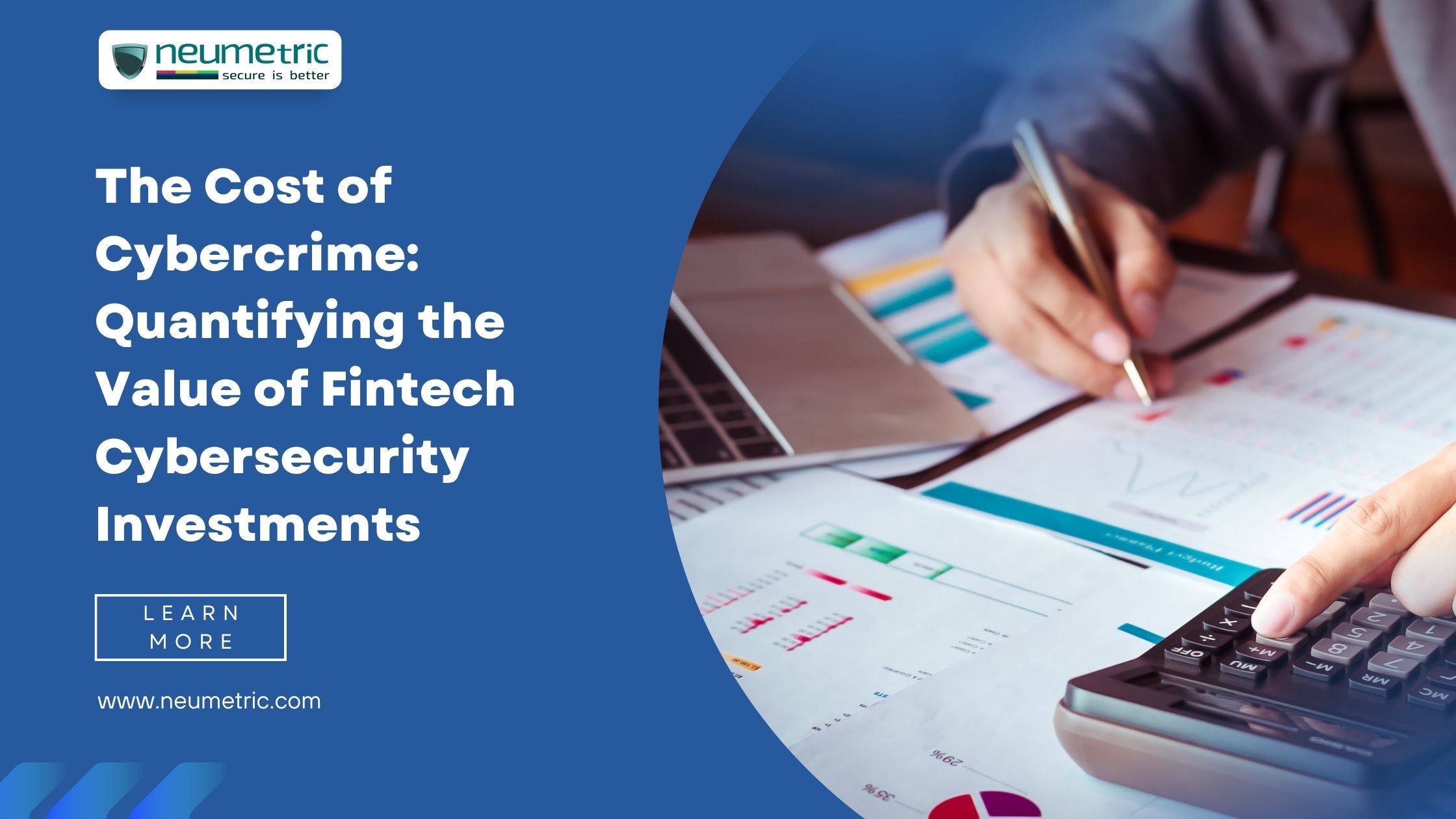Table of Contents
ToggleIntroduction
In the fast-paced landscape of fintech, where innovation thrives, an ominous shadow looms large—the escalating menace of cyber threats. This article thrusts into the forefront a stark reality: the surge in cyberattacks necessitates a profound reevaluation of fintech cybersecurity investments. As financial technology embeds itself ever deeper into our daily lives, the potential fallout from breaches reaches unprecedented heights. This piece stands as a clarion call for a fundamental shift in perspective—an acknowledgment that cybersecurity is not merely a budget line item but a strategic imperative.
The overarching thesis is unequivocal: to fortify the integrity of fintech operations & shield against the multifaceted costs of cybercrime, a substantial & proactive increase in cybersecurity budgets is not just advisable but imperative. The ensuing exploration delves into the intricate landscape of these imperatives, dissecting the financial ramifications, the fragile fabric of customer trust, regulatory intricacies, operational vulnerabilities & the ever-evolving threat landscape. It’s a journey into the heart of why cybersecurity is not just a defensive measure but the linchpin for the sustained growth & resilience of the fintech industry.
The Threat of Cybercrime
In the ever-evolving landscape of digital finance, the dance between innovation & risk has reached a fever pitch. As we ride the waves of fintech progress, it’s no secret that our digital footprints grow larger & more intricate, providing both a playground & a battleground for cybercriminals. The fusion of convenience & complexity in digital finance trends creates a perfect storm of cyber risks. From mobile banking to blockchain, each innovation introduces a new entry point for savvy cyber adversaries.
Among the most impactful cybercrimes haunting the fintech realm, data theft reigns supreme. The heist of sensitive customer information not only jeopardises personal privacy but opens floodgates for other nefarious activities. Fraud, another formidable foe, manifests in various guises, exploiting vulnerabilities in transaction processes. Extortion, the digital-age ransom, adds a sinister twist, holding businesses hostage for financial gain.
The impacts are not confined to balance sheets. The fallout of cybercrime extends into the delicate realm of customer trust, regulatory scrutiny & operational disruptions. The ripple effect is wide-ranging, demanding a strategic response. As we navigate this perilous digital terrain, the imperative to bolster fintech cybersecurity investments becomes more than a necessity—it’s a safeguard against the very soul of the industry.
Evaluating Cyber Security Impacts
- Tangible Consequences
Customer Retention Issues: Trust is the currency of the fintech realm. Cybersecurity breaches erode this trust, leading to customer hesitancy & potential attrition.
Lost Revenues: Immediate & direct, financial losses result from disruptions to services, compromised transactions & the aftermath of cyberattacks.
Recovery Costs: From compensating affected parties to fortifying security measures, the financial toll of recovery is a significant burden.
- Intangible Impacts
Reputational Damage: A scar that lingers, reputational harm affects current & potential customers, tarnishing the brand image.
Investor Confidence Decline: The cornerstone for growth, a drop in investor confidence can trigger sell-offs & a plunge in stock prices.
Stricter Regulations: Regulatory bodies respond to breaches with tighter controls, increasing compliance costs & operational burdens.
- Security Strategy Priorities
Rebuilding Trust: Beyond safeguarding data, the focus should be on actively rebuilding & fortifying trust through transparent communication & customer education.
Investing in Advanced Threat Detection: Proactive measures, such as advanced threat detection & response mechanisms, are essential for staying ahead of evolving cyber threats.
Fostering a Culture of Cybersecurity Awareness: Employees are the first line of defence. Cultivating a culture of cybersecurity awareness is crucial for mitigating internal risks.
In the high-stakes landscape of digital finance, the cost of cybersecurity investments transcends immediate financial implications. It’s a strategic imperative that involves not only protecting against cyber threats but actively shaping a resilient & trusted future for the fintech industry.
Calculating Security Investment ROI
In the complex world of fintech cybersecurity, quantifying the value of investments can be as elusive as chasing shadows. Traditional Return On Investment [ROI] measurements, rooted in the tangible realm of dollars & cents, struggle to encapsulate the multifaceted benefits of robust cybersecurity.
The challenges in quantifying cybersecurity value often stem from the intangible nature of its impacts. Traditional ROI metrics, designed for straightforward financial investments, fall short when applied to the intricate & dynamic landscape of cybersecurity. The qualitative benefits, however, wield significant influence.
Customer confidence stands as a cornerstone. When clients feel their financial transactions are safeguarded, it fosters loyalty & positive word-of-mouth. Company reputation, once tarnished by a breach, experiences a tangible rebound when fortified security measures are in place. Moreover, the overarching effect is risk reduction, an immeasurable yet invaluable outcome. By averting potential breaches, a company avoids not just the direct financial losses but the cascade of consequences that follow.
In the realm of fintech cybersecurity, where the true cost goes beyond immediate financial implications, recognizing the qualitative benefits becomes imperative for a comprehensive understanding of the ROI on security investments. It’s not just about the numbers; it’s about fortifying the foundation upon which the financial technology industry thrives.
Best Practices for Security Investment
In the ever-evolving battlefield of cybersecurity, adopting best practices is paramount for fintech firms.
Budgeting Priorities: Allocate resources wisely by identifying & prioritising critical security needs. Understanding the specific risks your firm faces allows for a targeted approach, ensuring that budgetary allocations align with the most significant threats.
Innovative Safeguards: Embrace cutting-edge technologies to stay one step ahead of cyber adversaries. From artificial intelligence for threat detection to blockchain for enhanced data integrity, integrating innovative safeguards is crucial for maintaining a robust defence.
Partnerships for Expertise: Cybersecurity is a dynamic field & staying abreast of the latest threats requires specialised knowledge. Forge partnerships with cybersecurity experts & firms, leveraging their expertise to enhance your defence mechanisms. Collaborative efforts amplify the effectiveness of your security strategy, ensuring a comprehensive & adaptive approach to cyber threats.
In the realm of fintech cybersecurity, proactive & strategic investments, coupled with these best practices, create a formidable defence against the ever-growing threat landscape.
The Need for Proactive Fintech Security
In the relentless dance between innovation & cyber threats, the need for proactive fintech security has never been more pressing.
Intensifying Threats: The digital era brings unprecedented opportunities, but it also ushers in a wave of increasingly sophisticated cyber threats. From ransomware attacks to data breaches, the risks are multifaceted & ever-evolving.
Importance of Proactive Investments
Risk Mitigation: Proactivity is the armour against the evolving arsenal of cyber threats. By investing proactively in robust security measures, fintech firms not only safeguard against immediate risks but also mitigate the potential fallout of future, more sophisticated attacks.
Long-Term Success: In the rapidly evolving landscape of digital finance, longevity hinges on resilience. Proactive security investments aren’t just a shield against current threats; they are the foundation for long-term success, fostering trust & ensuring the sustained growth of the fintech industry. In this dynamic ecosystem, the case for proactivity isn’t just a strategic choice—it’s a survival imperative.
Conclusion
In the fast-paced arena of fintech, the imperative for robust cybersecurity investments reverberates through the industry. Cyber threats, evolving in sophistication, pose multifaceted risks that extend beyond immediate financial losses. This journey into the cost of cybercrime underscores the pivotal role of proactive measures. From customer trust erosion to reputational damage & regulatory scrutiny, the impacts are profound & far-reaching.
To stakeholders, the call to action is clear: prioritise cybersecurity investments as a strategic necessity. It’s not merely about protecting against current threats but building a resilient foundation for the future. Embrace innovation, allocate resources wisely & forge partnerships to navigate the complex landscape of cyber threats. In this dynamic digital realm, the cost of inaction far exceeds the investment in a secure & thriving fintech future.
FAQ
- Why is cybersecurity particularly critical for fintech companies & how does it go beyond just protecting financial transactions?
In the fast-evolving world of fintech, cybersecurity isn’t just about safeguarding transactions; it’s about preserving the very essence of trust that underpins financial services. The content emphasises that breaches not only lead to immediate financial losses but also erode customer trust, damage company reputations & trigger regulatory scrutiny. It’s a holistic defence, crucial for the sustained growth & resilience of the entire industry.
- How can fintech companies measure the Return On Investment [ROI] for their cybersecurity efforts when the impacts are both tangible & intangible?
The content suggests that measuring the ROI for cybersecurity goes beyond traditional metrics. While tangible impacts like lost revenues & recovery costs are measurable, the qualitative benefits—such as customer confidence, company reputation & risk reduction—are equally significant. Fintech firms are encouraged to adopt a comprehensive approach, acknowledging both the tangible & intangible dimensions of cybersecurity investment returns.
- In the face of intensifying cyber threats, what practical steps can fintech companies take to proactively secure their operations for long-term success?
Recognizing the intensifying threats, the content advocates for proactive measures. Fintech companies are advised to allocate resources wisely, embrace cutting-edge technologies & form strategic partnerships with cybersecurity experts. The emphasis is on fortifying defences not just against current threats but laying the groundwork for long-term success. It’s a call to action for stakeholders to prioritise cybersecurity as a strategic imperative in the dynamic landscape of digital finance.





